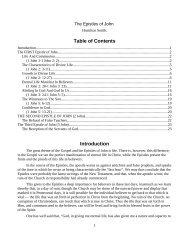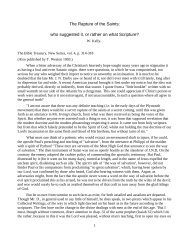An Exposition of Revelation .pdf
An Exposition of Revelation .pdf
An Exposition of Revelation .pdf
Create successful ePaper yourself
Turn your PDF publications into a flip-book with our unique Google optimized e-Paper software.
way <strong>of</strong> government ("before his throne"). How different from the truth <strong>of</strong> the same Spirit sent forth<br />
from heaven, and baptising the saints into the one body <strong>of</strong> Christ here below! But there is no just<br />
ground for thinking <strong>of</strong> created spirits or angels in this connection any more than in Rev. 5: 6. Never do<br />
the seven Spirits pay worship to God; and the reason is, that they mean God's Spirit. It is only in<br />
Christianity and the church that we know God as He is — Father, Son, and Holy Spirit. In<br />
government, whether <strong>of</strong> Old or in Apocalyptic scenes, He is not so revealed. But it is an <strong>of</strong>fence<br />
against truth to mix up Creator and creature. It is the completeness <strong>of</strong> the Holy Ghost's energy as an<br />
overruling power. What the application <strong>of</strong> this may be depends on the context where it is used. It is in<br />
relation to Christ dealing ecclesiastically in <strong>Revelation</strong> 3, and again in His relation to the earth in<br />
<strong>Revelation</strong> 5; but it is always the Spirit in full variety <strong>of</strong> governmental power, rather than the same<br />
Spirit viewed in His unity as forming the church into one body. This we have had already in the<br />
Pauline Epistles, where the proper sphere <strong>of</strong> the Christian as a member <strong>of</strong> Christ's body is treated<br />
especially, and indeed only there.<br />
God as such is thus introduced in Old Testament style and character, but applied to New<br />
Testament subjects in a far larger way; the Holy Ghost also is similarly brought before us; and so too<br />
with our Lord. "<strong>An</strong>d from Jesus Christ, the faithful witness, the firstborn <strong>of</strong> the dead, and the prince<br />
[or, ruler] <strong>of</strong> the kings <strong>of</strong> the earth." Indeed there is nothing more remarkable, especially when we bear<br />
in mind who the writer is, than the absence here <strong>of</strong> Christ's proper relationship to the children <strong>of</strong> God.<br />
<strong>Revelation</strong> <strong>of</strong> grace is precisely what is not found in this book, if one search into the character <strong>of</strong> its<br />
visions generally. "Jesus Christ" appears as the Faithful Witness. This clearly He was on the earth<br />
when man wholly failed. In a very different tone it was John's topic everywhere. We may look on the<br />
Lord as gone up to heaven, where Paul loved to contemplate Him glorified; but John habitually points<br />
to Christ the eternal Word and Son as He was here below. If he speaks <strong>of</strong> Him as the Lamb above, the<br />
description is founded on His having been the rejected sufferer on earth. Next He is "the firstborn <strong>of</strong><br />
the dead." This too He was on earth. Satan, who had the power <strong>of</strong> death, had nothing in Him; but by<br />
the grace and for the glory <strong>of</strong> God He died, and rose victorious, the Firstborn <strong>of</strong> the dead. Again, as<br />
"the prince <strong>of</strong> the kings <strong>of</strong> the earth," He waits to be displayed when He comes by-and-by to earth. But<br />
what He is now for us in God's presence and does in heaven in activity <strong>of</strong> grace is exactly what we<br />
have not given us here. There is the most careful exclusion from the book <strong>of</strong> His heavenly position as<br />
Head or even our High Priest. Even the present grace which livingly connects Him with the Christian<br />
is left out.<br />
Thus the Lord Jesus is here brought before us as Man on earth, required specially for the<br />
purpose <strong>of</strong> this prophetic book. God was announced in His own eternal being; the Holy Ghost in His<br />
varied fulness <strong>of</strong> governmental power; the Lord Jesus in that which connected Him not with heaven<br />
but with the earth, even if risen from the dead, and the coming King <strong>of</strong> kings. He is for this and<br />
perhaps other reasons put in the last place.<br />
But when Christ is named, the voice <strong>of</strong> Christians is at once heard. This is so much the more<br />
remarkable, because it is one <strong>of</strong> the sweet exceptional ripples which cross the ordinary current <strong>of</strong> the<br />
book at the end as well as at the beginning. It is not so when the course <strong>of</strong> the visions is fairly entered<br />
on. Before these begin Christians are heard, as the bride is after the visions close. The name <strong>of</strong> Jesus is<br />
enough to stir the heart, for those who know Him as we do, in a suited doxology. He may not be<br />
described in His relationships peculiar to us, but He who is described is the One that loves us and that<br />
we love. So we say, "To him that loveth us" (for this is the true reading and rendering, not merely that<br />
"loved" us) — "to him that loveth us, and washed us from our sins in his blood; and he made us a<br />
kingdom, priests to his God and Father; to him [be] the glory and the might unto the ages <strong>of</strong> the ages."<br />
8






